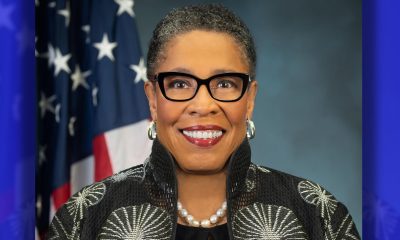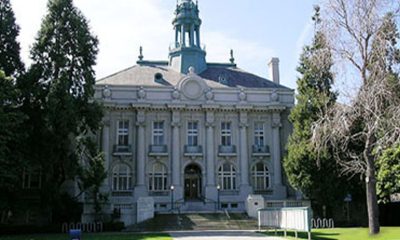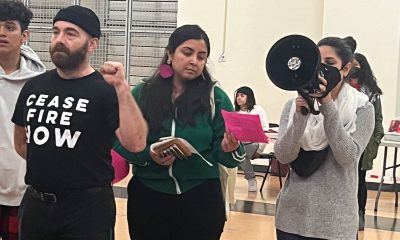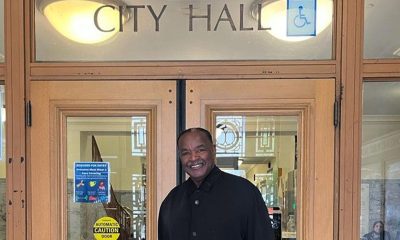Activism
Sojourner Truth Manor Tenants Meet Face-to-Face with Landlords
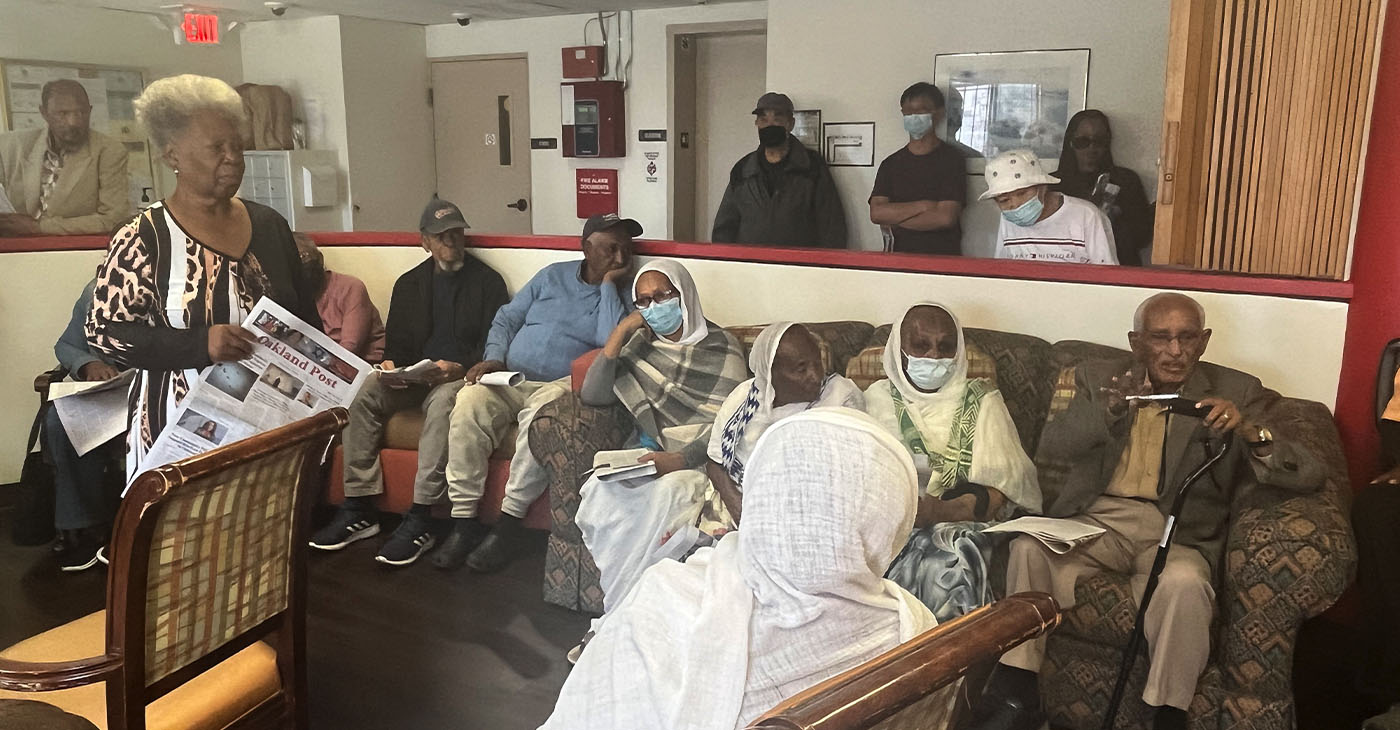
Tenants want 4 residents added to the housing complex’s board of directors
By Ken Epstein
About 100 tenants of Sojourner Truth Manor, joined by community supporters and local political leaders, packed into the lobby of one of the buildings of the nonprofit senior citizens’ complex in North Oakland last Friday to meet with their landlords to seek solutions to residents’ concerns about deteriorating living conditions, lack of communication on the part of management and ongoing bullying and intimidation.
“Sojourner Truth was founded in 1974 by 15 strong, Black community-minded women, who would be raising hell about the conditions that currently exist here at Sojourner Truth Manor,” said Beverly Colston, chairperson of the tenants’ association, who chaired the meeting.
Among those who attended the meeting of the 85-unit, three-building housing complex at 6015 Martin Luther King Jr. Way were Dan Kalb, District 1 Oakland City Councilmember and candidate for State Senate; Lisa Williams, senior field representative of Assemblymember Mia Bonta; Romario Conrado, representative of State Senator Nancy Skinner; and Breeanna Decker, representative of Alameda County Supervisor Keith Carson.
Also at the meeting were members of the Berkeley branch of the NAACP; Friends of Adeline, a community organization that has been supporting the tenants; Oakland Post publisher Paul Cobb; and residents of a nearby Berkeley senior residence, Harriet Tubman Terrace, who came to show solidarity with their neighbors.
One of the tenants’ major concerns, said Colston, was the closing and demolition of the community room nearly a decade ago, a central place where residents and their families could come together, learn about each other’s cultures and “exchange laughter and joy: cooking, playing games, knitting and crocheting, dancing and exercising.”
Colston asked management a question: “What is the timeline to start, and what is the timeline to finish construction on building our Community Room?”
HumanGood, the property management company hired by the board of directors that owns the complex, was brought in a year ago to revitalize Sojourner Truth after years of neglect under the past property managers.
The new company said it has been trying to renovate the community room for the past year but told tenants it was unable to obtain city building permits. However, during last week’s meeting, it appeared that HumanGood had not yet applied for permits.
Human Good is the sixth-largest nonprofit senior living provider in the country, operating nearly 100 affordable housing communities, serving about 8,880 residents.
Another major tenant concern was the elimination almost a year ago of the position of Social Services Coordinator, who used to help organize social events, providing counseling, and help tenants prepare for the annual recertification of Medicare, Medi-Cal, and housing requirements as well as help with their phones, tablets and other issues.
Colston also said communications between the board and the tenants would improve if four of their residents were added to the board of directors.
Tenants have said that the former social services coordinator helped alleviate stressful situations. “Since she’s been gone, mental and emotional stress have had an adverse effect on all aspects of our lives,” said resident Nancy Delaney.
Another tenant, Joyce Rodriquez, also voiced tenant concerns.
“We need security and safety,” she said. “Our residents are feeling unsafe in our own apartments.”
Communication is minimal or nonexistent, she said. Information from management arrives on tenants’ doors written only in English and often not comprehensible, though there are six different languages spoken at Sojourner Truth. “Tenants need translation in all their languages,” she said.
Not all entrances and exits are wheelchair accessible to the residents, Rodriguez continued.
There is also a lack of pest control. “We have infestation problems in the buildings: rodents, roaches, and bedbugs, and they’re not being addressed properly.”
Walter Johnson, president of the Sojourner Truth board, criticized tenants for not communicating with him or telling him about Friday’s meeting, which the tenants denied.
“I’m insulted,” he said. “No one has contacted me to see the status of the things that were going on here. I never stopped trying to work for Sojourner Truth.”
Johnson, who worked for many years as an administrator for the City of Oakland, said he was committed to improving conditions at Sojourner Truth.
But the way forward is not to blame anyone or hold large meetings with outsiders with lots of shouting. What is needed is a small group of tenants who will work with board to see solutions and ensure “the correct information gets in the newspapers.”
“I want to work with Beverly (Colston) and whoever else she wants to put in the group, but we’re not going to solve this with 100 people in the room,” Johnson said. (We need) a committee that’s committed to do what needs to be done.”
Kendra Roberts, who oversees operations for 100 senior communities for HumanGood, said the first time she walked through Sojourner Truth Manor, “our hearts were broken,” seeing a construction project that had begun years ago was never completed.
Along with the Community Room, “a total of five apartments have been off-line for five years, which has had “a tremendous financial impact to the community,” meaning that there is not sufficient income to pay the salary of a social services coordinator.
However, tenants said they spoke with a HUD supervisor in April, and he said to tell HumanGood to hire a social services coordinator and pay for the position from the money paid to HUD. However, tenants were told the board had to make the decision, and nothing more was said about the matter.
Wrapping up the meeting, Colston said she was pleased with what had been accomplished.
“We have the city, we have the state, we have the county, we have the federal government – all here in one room,” she said.
“I have accomplished what I wanted to do. We live here, and we have been here. Let’s have communication,” Colston said.
“Now let’s move forward. Let’s get this building back where it should be.”
Activism
Oakland Post: Week of April 24 – 30, 2024
The printed Weekly Edition of the Oakland Post: Week of April 24 – 30, 2024

To enlarge your view of this issue, use the slider, magnifying glass icon or full page icon in the lower right corner of the browser window. ![]()
Activism
Oakland Post: Week of April 17 – 23, 2024
The printed Weekly Edition of the Oakland Post: Week of April 17 – 23, 2024

To enlarge your view of this issue, use the slider, magnifying glass icon or full page icon in the lower right corner of the browser window. ![]()
Activism
Oakland Schools Honor Fred Korematsu Day of Civil Liberties
Every Jan. 30, OUSD commemorates the legacy of Fred Korematsu, an Oakland native, a Castlemont High School graduate, and a national symbol of resistance, resilience, and justice. His defiant stand against racial injustice and his unwavering commitment to civil rights continue to inspire the local community and the nation. Tuesday was “Fred Korematsu Day of Civil Liberties and the Constitution” in the state of California and a growing number of states across the country.

By Post Staff
Every Jan. 30, OUSD commemorates the legacy of Fred Korematsu, an Oakland native, a Castlemont High School graduate, and a national symbol of resistance, resilience, and justice.
His defiant stand against racial injustice and his unwavering commitment to civil rights continue to inspire the local community and the nation. Tuesday was “Fred Korematsu Day of Civil Liberties and the Constitution” in the state of California and a growing number of states across the country.
One OUSD school is named in his honor: Fred T. Korematsu Discovery Academy (KDA) elementary in East Oakland.
Several years ago, founding KDA Principal Charles Wilson, in a video interview with anti-hate organization “Not In Our Town,” said, “We chose the name Fred Korematsu because we really felt like the attributes that he showed in his work are things that the children need to learn … that common people can stand up and make differences in a large number of people’s lives.”
Fred Korematsu was born in Oakland on Jan. 30, 1919. His parents ran a floral nursery business, and his upbringing in Oakland shaped his worldview. His belief in the importance of standing up for your rights and the rights of others, regardless of race or background, was the foundation for his activism against racial prejudice and for the rights of Japanese Americans during World War II.
At the start of the war, Korematsu was turned away from enlisting in the National Guard and the Coast Guard because of his race. He trained as a welder, working at the docks in Oakland, but was fired after the bombing of Pearl Harbor in 1941. Fear and prejudice led to federal Executive Order 9066, which forced more than 120,000 Japanese Americans out of their homes and neighborhoods and into remote internment camps.
The 23-year-old Korematsu resisted the order. He underwent cosmetic surgery and assumed a false identity, choosing freedom over unjust imprisonment. His later arrest and conviction sparked a legal battle that would challenge the foundation of civil liberties in America.
Korematsu’s fight culminated in the Supreme Court’s initial ruling against him in 1944. He spent years in a Utah internment camp with his family, followed by time living in Salt Lake City where he was dogged by racism.
In 1976, President Gerald Ford overturned Executive Order 9066. Seven years later, the 9th Circuit Court of Appeals in San Francisco vacated Korematsu’s conviction. He said in court, “I would like to see the government admit that they were wrong and do something about it so this will never happen again to any American citizen of any race, creed, or color.”
Korematsu’s dedication and determination established him as a national icon of civil rights and social justice. He advocated for justice with Rosa Parks. In 1998, President Bill Clinton gave him the Presidential Medal of Freedom saying, “In the long history of our country’s constant search for justice, some names of ordinary citizens stand for millions of souls … To that distinguished list, today we add the name of Fred Korematsu.”
After Sept. 11, 2001, Korematsu spoke out against hatred and discrimination, saying what happened to Japanese Americans should not happen to people of Middle Eastern descent.
Korematsu’s roots in Oakland and his education in OUSD are a source of great pride for the city, according to the school district. His most famous quote, which is on the Korematsu elementary school mural, is as relevant now as ever, “If you have the feeling that something is wrong, don’t be afraid to speak up.”
-

 Activism4 weeks ago
Activism4 weeks agoOakland Post: Week of March 27 – April 2, 2024
-

 #NNPA BlackPress4 weeks ago
#NNPA BlackPress4 weeks agoBeloved Actor and Activist Louis Cameron Gossett Jr. Dies at 87
-

 Community1 week ago
Community1 week agoFinancial Assistance Bill for Descendants of Enslaved Persons to Help Them Purchase, Own, or Maintain a Home
-

 Activism3 weeks ago
Activism3 weeks agoOakland Post: Week of April 3 – 6, 2024
-

 Business1 week ago
Business1 week agoV.P. Kamala Harris: Americans With Criminal Records Will Soon Be Eligible for SBA Loans
-

 Activism2 weeks ago
Activism2 weeks agoOakland Post: Week of April 10 – 16, 2024
-

 Community1 week ago
Community1 week agoAG Bonta Says Oakland School Leaders Should Comply with State Laws to Avoid ‘Disparate Harm’ When Closing or Merging Schools
-

 Community6 days ago
Community6 days agoOakland WNBA Player to be Inducted Into Hall of Fame


